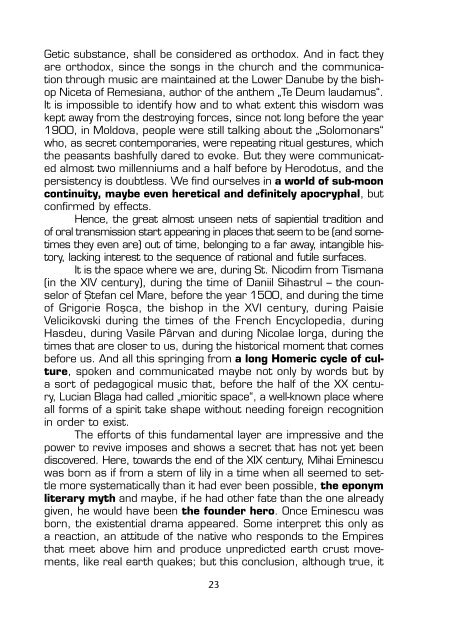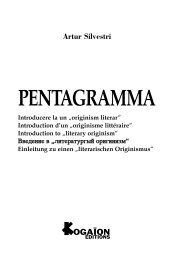genius loci pt. pdf.qxd - ROMANIAN LIBRARY
genius loci pt. pdf.qxd - ROMANIAN LIBRARY
genius loci pt. pdf.qxd - ROMANIAN LIBRARY
Create successful ePaper yourself
Turn your PDF publications into a flip-book with our unique Google optimized e-Paper software.
Getic substance, shall be considered as orthodox. And in fact they<br />
are orthodox, since the songs in the church and the communication<br />
through music are maintained at the Lower Danube by the bishop<br />
Niceta of Remesiana, author of the anthem „Te Deum laudamus“.<br />
It is impossible to identify how and to what extent this wisdom was<br />
ke<strong>pt</strong> away from the destroying forces, since not long before the year<br />
1900, in Moldova, people were still talking about the „Solomonars“<br />
who, as secret contemporaries, were repeating ritual gestures, which<br />
the peasants bashfully dared to evoke. But they were communicated<br />
almost two millenniums and a half before by Herodotus, and the<br />
persistency is doubtless. We find ourselves in a world of sub-moon<br />
continuity, maybe even heretical and definitely apocryphal, but<br />
confirmed by effects.<br />
Hence, the great almost unseen nets of sapiential tradition and<br />
of oral transmission start appearing in places that seem to be (and sometimes<br />
they even are) out of time, belonging to a far away, intangible history,<br />
lacking interest to the sequence of rational and futile surfaces.<br />
It is the space where we are, during St. Nicodim from Tismana<br />
(in the XIV century), during the time of Daniil Sihastrul — the counselor<br />
of ªtefan cel Mare, before the year 1500, and during the time<br />
of Grigorie Roºca, the bishop in the XVI century, during Paisie<br />
Velicikovski during the times of the French Encyclopedia, during<br />
Hasdeu, during Vasile Pârvan and during Nicolae Iorga, during the<br />
times that are closer to us, during the historical moment that comes<br />
before us. And all this springing from a long Homeric cycle of culture,<br />
spoken and communicated maybe not only by words but by<br />
a sort of pedagogical music that, before the half of the XX century,<br />
Lucian Blaga had called „mioritic space“, a well-known place where<br />
all forms of a spirit take shape without needing foreign recognition<br />
in order to exist.<br />
The efforts of this fundamental layer are impressive and the<br />
power to revive imposes and shows a secret that has not yet been<br />
discovered. Here, towards the end of the XIX century, Mihai Eminescu<br />
was born as if from a stem of lily in a time when all seemed to settle<br />
more systematically than it had ever been possible, the eponym<br />
literary myth and maybe, if he had other fate than the one already<br />
given, he would have been the founder hero. Once Eminescu was<br />
born, the existential drama appeared. Some interpret this only as<br />
a reaction, an attitude of the native who responds to the Empires<br />
that meet above him and produce unpredicted earth crust movements,<br />
like real earth quakes; but this conclusion, although true, it<br />
23



